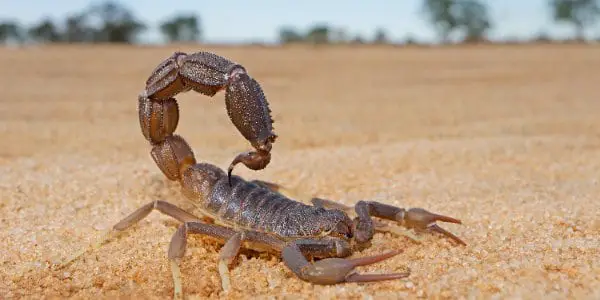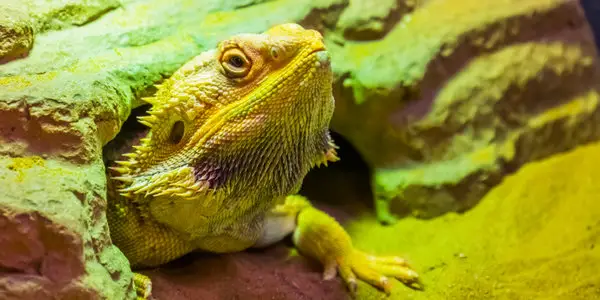Bearded dragons are hardy pets, and in the wild, they have to fend for themselves. The habitat, living conditions, and diet you provide in captivity should reflect that of their wild environment.
Even though hardy, these omnivorous reptiles do not eat everything. Some plants and small animals are poisonous to them and thus do not form a part of their staple diet. As such, you may wonder;
Can bearded dragons eat scorpions?
No, beardies can’t eat scorpions. All scorpion species are poisonous and thus harmful to your pet. In addition, the digestive system of bearded dragons makes it hard for the pet to eat and digest scorpions.
There are various insects that bearded dragons predate on. However, scorpions are not insects; they have eight legs while insects have two. In addition, they have two body parts while insects have three.
Scorpions like climbing, just like bearded dragons, although bearded dragons are not good climbers. They share some typical habitats such as under rocks, on top of stones, etc.
Thus, these animals are bound to interact in the wild. Let us look at why bearded dragons can’t eat scorpions and which other animals are toxic to bearded dragons as we answer your frequently asked questions.
4 Reasons Why Bearded Dragons Can’t Eat Scorpions
Feeding bearded dragon scorpions are not suitable for several reasons. Below are the main reasons you should not feed scorpions to your pet beardie.
1. Venomous
All species of scorpions are venomous, but some are not poisonous to some animals. They use the venom to paralyze and kill their target prey, including various insects, centipedes, and scorpions.
It also acts as a self-defense mechanism, helping them protect themselves against predators such as birds, large lizards, bats, and large centipedes.
Your bearded dragon might die if it is stung by the scorpion or eats one with poison.
2. Hard Exoskeletons
Scorpions have hard exoskeletons that feature chitin, a hard-to-digest material. It is a defense and survival mechanism.
Although bearded dragons have teeth, their teeth are not strong enough to break down the scorpion’s exoskeleton. Should the beardie break the exoskeleton, it would still be challenging for their stomachs to digest them.
The undigested exoskeleton can make the beardie uncomfortable. It might also cause impaction leading to health problems. Impaction is dangerous, and prolonged cases can lead to death.
3. Source of Threat
Having a scorpion in the beardie’s tank will make it feel threatened. The pet might decide to hide or fight the scorpion. It can cause immense stress to your bearded dragon, which is not healthy.
On the other hand, the scorpion might also feel threatened by being in an enclosure with what looks like a predator.
As such, the scorpion might attack your bearded dragon. A fight between a bearded dragon and a scorpion can be deadly for the lizard because the scorpion will most likely sting it.
4. Low Nutritional Value
Even if scorpions were not poisonous and did not have hard exoskeletons, they would still not be the most suitable food choice for bearded dragons. There are better, more nutritious meals you can give the pet.

4 Other Animals Not To Feed Your Bearded Dragon
Besides scorpions, there are other animals you should not feed your beardie with.
1. Venomous Insects
There are various venomous insects such as scorpions, centipedes, bees, and hornets. All of them should live in the same habitat with a bearded dragon, and neither should they be given to them as food.
2. Wild-Caught Insects
Wild insects might seem like a money-saving way of feeding your bearded dragon. However, it is not a good idea as it might cost your pet its life.
Such insects carry a variety of bacteria and parasites that are harmful to the lizard. Should these be transmitted to your pet, it might get sick or even die.
Only feed it with home-cultured insects or those sold at the pet store for your bearded dragon’s safety.
3. Fireflies
These animals are toxic to bearded dragons and should not be a part of their diet, however minimal. They are known to cause death in bearded dragons. In addition, you should also avoid giving the lizard other glowing insects.
4. Caterpillars
Caterpillars feed on various plants and may seem harmless to bearded dragons.
However, some of the plants they eat are toxic to bearded dragons, and by the pet feeding on the caterpillar, it is indirectly feeding on the toxins. Butterflies fall in the same category as caterpillars.
Frequently Asked Questions
Can a Scorpion Kill My Bearded Dragon?
Yes, a scorpion can kill a bearded dragon. If it stings the reptile, the venomous sting might be poisonous to the lizard leading to death or severe illness. In addition, a scorpion can also kill a bearded dragon by way of causing impaction when the beardie eats it.
Can Bearded Dragons Eat Spiders?
As with scorpions and most arthropods, you should avoid giving them to your pet beardie. Poisonous spider species are harmful to bearded dragons, and its hard to tell apart the harmful poisonous spiders species just by looking at them.
Another reason why spiders are not suitable for a bearded dragon is that they carry parasites and bacteria, which are harmful to the pet. Besides, spiders do not have good nutritional benefits to bearded dragons.
READ NEXT: Can Bearded Dragons Eat Spiders? Full Guide!
Which Foods Are Toxic To Bearded Dragons?
Bearded dragons eat both plants and animals. Some of the plants you should avoid include onions, garlic, avocados, leeks, eggplants, mushrooms, and iceberg lettuce. These plants have too much water, lack enough vitamins and minerals, or are high in oxalates which are toxic to bearded dragons.
Toxic animals for bearded dragons include venomous insects, luminous insect species such as fireflies, scorpions, arthropods such as spiders, butterflies, and caterpillars.

Conclusion
Bearded dragons eat a variety of animals in the wild and captivity. Even so, scorpions do not form a suitable part of their meals.
Scorpions have tough exoskeletons, are venomous, and do not have most of the vitamins and minerals that bearded dragons need to survive.
Do not feed your beardie scorpions; instead, find more suitable options that are non-toxic and more nutritious. Your pet will thrive and live for a long time with the proper diet.
As bearded dragon owners, its important to provide a well balanced diet for your beardies and avoid any potentially harm food.
READ NEXT: What Do Bearded Dragons Eat? Ultimate Guide
